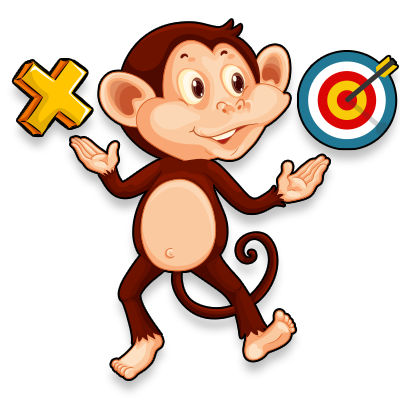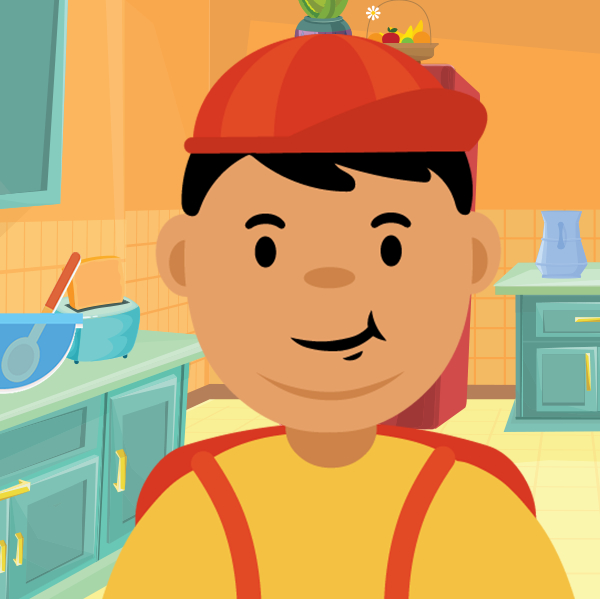Problem Solving
How do you use what you’ve learned to problem solve?
Goal:
Goal:

Practice!
Goal: Apply what you have learned about the properties of operations to solve a multiplication word problem.
You used the properties of operations to solve addition equations. The same properties work for multiplication equations! Can you use the properties of operations to solve a multiplication word problem? You will need a piece of lined paper. Follow the problem-solving steps to find the answer. Then click the tabs to see how!
Daniel has 3 plates with 4 “ants on a log” snacks on each plate. Each snack has 2 raisins. How many raisins are there in all?
\({3 \times 4 \times 2 = ?}\)
Word Problem Solving Steps
- Read the problem.
- Look for important information.
- Write a math sentence.
- Choose a way to solve.
- Solve and label your answer.

Read the Problem
Daniel has 3 plates with 4 “ants on a log” snacks on each plate. Each snack has 2 raisins. How many raisins are there in all?
The first step is to read. Write down the problem. Then read the problem again! It is helpful to read the problem as many times as you need to see all the important information!
Find the Important Information
Daniel has 3 plates with 4 “ants on a log” snacks on each plate. Each snack has 2 raisins. How many raisins are there in all?
Now you need to look for the important information. Highlight the important numbers. Circle the key words or key word if there is only one. It helps to highlight each digit to show place value. It also helps to underline the question. Click the Show Me button to see!

Daniel has 3 plates with 4 'ants of a log' snacks on each plate. Each snack has 2 raisins. How many raisins are there in all?
The numbers 3, 4, and 2 are highlighted
each is circled
in all is circled
2, 4, and 3 are the important numbers. The key words “each” and “in all” tell you to multiply. The question is the last sentence in the problem. It asks how many raisins there are in all.
Write an Equation

Daniel has 3 plates with 4 'ants of a log' snacks on each plate. Each snack has 2 raisins. How many raisins are there in all?
The numbers 3, 4, and 2 are highlighted
each is circled
in all is circled
\({3 \times 4 \times 2 = ?}\)
Daniel wrote the equation \({3 \times 4 \times 2 }\) for you. Write it down underneath the word problem. The associative property says that you can add addends in any order. You can also multiply factors in any order.
Decide which two factors you want to multiply first and put parentheses around them. Click the Show Me button to see how!
\({(3 \times 4) \times 2 = ?}\)
or
\({3 \times (4 \times 2) = ?}\)
Step 4 Choose a Way to Solve

Daniel has 3 plates with 4 'ants of a log' snacks on each plate. Each snack has 2 raisins. How many raisins are there in all?
The numbers 3, 4, and 2 are highlighted
each is circled
in all is circled
\({(3 \times 4) \times 2 = 24}\)
or
\({3 \times (4 \times 2) = ?}\)
Daniel chose the first equation. Use his answer to find the answer to the second equation. Then click the Show Me button to check your work!
\({3 \times (4 \times 2) = 24}\)
\({3 \times 8= 24}\)
The associative property says that you can multiply factors in any order. This means that the first equation and the second equation will have the same product. Also: \({4 \times 2 = 8}\) \({3 \times 8 = 24}\)
Solve and Label Your Answer

Daniel has 3 plates with 4 'ants of a log' snacks on each plate. Each snack has 2 raisins. How many raisins are there in all?
The numbers 3, 4, and 2 are highlighted
each is circled
in all is circled
You found that the product is 24! Write the product with the correct label word underneath the multiplication sentence.
Question
How many raisins are there in all?
There are 24 raisins in all.
Now use the steps to try this out on your own!
Read and Solve
Read the word problem below. Use the properties of operations to find the product of the second equation.
Daniel has 5 plates. There are 7 snacks on each plate. How many snacks does Daniel have in all?
\({7 \times 5 = 35}\)
\({5 \times 7 = ?}\)
The commutative property says that switching the places of two factors will not change the product of a multiplication equation. Look at the product of the first equation!
The commutative property says that switching the places of two factors will not change the product of a multiplication equation. Look at the product of the first equation!
Correct! switching the places of the two factors does not change the product of the multiplication equation.
You got # out of # correct. Click the Retry button for another attempt.
You got a perfect score. Great job!